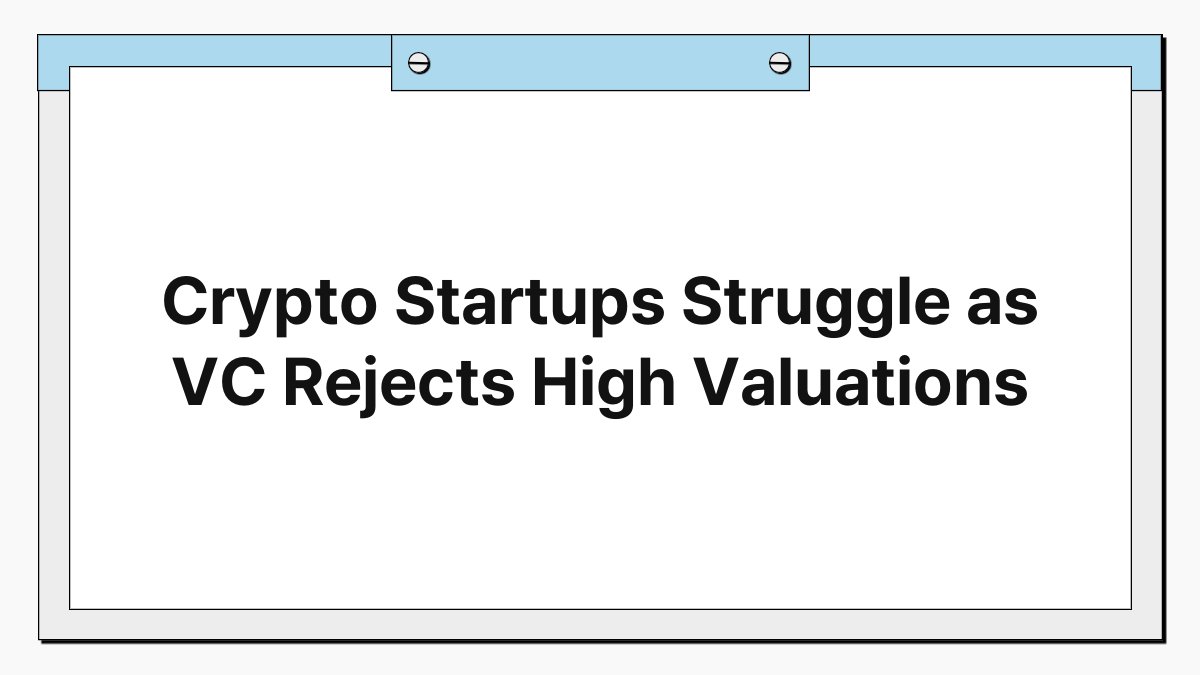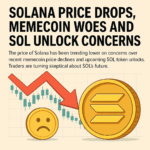[케이브릿지 미디어/Jay Son] In recent months, the landscape for cryptocurrency startups has shifted dramatically as venture capital firms become increasingly cautious about high valuations.
This article will explore the challenges faced by these startups in securing funding amidst a tightening investment climate.
Readers will gain insights into the factors influencing venture capital decisions, the implications of changing market dynamics, and the potential strategies for crypto startups to navigate this complex environment.
The analysis will include a comparison of trends in major markets such as the United States, Europe, and Asia.
By understanding these developments, investors and industry stakeholders can better position themselves for the evolving landscape of cryptocurrency investments.
The Decline of High Valuations in Crypto Startups
The cryptocurrency market has experienced significant volatility over the past few years.
In the wake of this volatility, venture capital firms are reassessing their investment strategies.
High valuations that were once commonplace are now being scrutinized more closely.
This shift reflects a broader trend where investors prioritize sustainability and long-term growth over inflated short-term gains.
Consequently, many crypto startups are finding it increasingly difficult to secure funding at previously anticipated valuations.
The current landscape indicates that investors are becoming more selective.
They are focusing on startups that demonstrate clear use cases and substantial market potential.
As a result, many startups that once thrived on aggressive growth projections are now being challenged to provide more concrete evidence of their business models.
This change in investor sentiment is reshaping the funding environment for crypto startups.
Moreover, the overall economic climate is influencing venture capital decisions.
Rising interest rates and inflationary pressures are prompting investors to adopt a more cautious approach.
They are looking for companies that can withstand economic downturns and demonstrate resilience.
This has led to a reevaluation of risk profiles associated with crypto investments.
The combination of these factors is causing a significant shift in how venture capital firms engage with the crypto sector.
Market Behavior and Investor Sentiment
Investor sentiment plays a crucial role in shaping the funding landscape for crypto startups.
The recent downturn in cryptocurrency prices has led to a more cautious approach among investors.
Many are reevaluating their portfolios and considering the long-term viability of their investments.
This shift has created a ripple effect, impacting the ability of startups to attract capital.
The decline in cryptocurrency prices has prompted venture capital firms to adopt a more conservative stance.
They are prioritizing investments in projects that demonstrate strong fundamentals and a clear path to profitability.
This change is evident in the increased focus on due diligence processes.
Investors are now demanding more comprehensive assessments of market potential and competitive positioning before committing funds.
As a result, the funding environment has become more competitive.
Startups are facing pressure to differentiate themselves in a crowded marketplace.
They must articulate compelling value propositions and demonstrate their ability to adapt to changing market conditions.
This heightened scrutiny is forcing many startups to refine their business models and pivot towards more sustainable growth strategies.
Regulatory Changes Impacting Investment
Regulatory developments are another critical factor influencing the funding landscape for crypto startups.
Governments around the world are increasingly focusing on establishing frameworks for cryptocurrency and blockchain technologies.
These regulations can significantly impact investor confidence and the overall market environment.
In regions such as the European Union and the United States, regulatory clarity is evolving.
While some regulations aim to protect investors and ensure market integrity, others may impose restrictions that could stifle innovation.
Startups must navigate this complex regulatory landscape while ensuring compliance.
This challenge can deter potential investors who fear the implications of regulatory uncertainty.
Furthermore, the pace of regulatory change can create additional hurdles for startups seeking funding.
Investors may be hesitant to commit capital to projects that could face regulatory scrutiny.
This caution can slow down the funding process and lead to extended timelines for startups.
As such, understanding the regulatory environment is essential for crypto startups aiming to attract investment.
Global Comparison of Venture Capital Trends
Comparing venture capital trends across major markets reveals significant variances in investor behavior and startup funding.
In the United States, venture capital firms have historically been more aggressive in their investment strategies.
However, the recent shift towards caution has led to a reevaluation of high-risk investments.
In contrast, the European market is witnessing a growing emphasis on regulatory compliance and sustainable business practices.
European investors are increasingly focusing on projects that align with environmental, social, and governance criteria.
This trend reflects a broader shift towards responsible investing, which may influence funding decisions for crypto startups in the region.
Asia presents a unique landscape where regulatory environments vary widely.
Some countries have embraced cryptocurrency innovation while others have imposed strict regulations.
This disparity creates both opportunities and challenges for startups seeking funding.
Investors in Asian markets may be more willing to take risks, but they also face the complexities of navigating diverse regulatory frameworks.
Strategies for Startups to Adapt
To thrive in the current investment climate, crypto startups must adopt proactive strategies.
First and foremost, they should focus on building strong fundamentals.
This includes developing a clear business model that demonstrates potential for sustainable growth.
Investors are increasingly looking for evidence of market traction and user adoption.
Startups that can showcase these metrics will be better positioned to attract funding.
Additionally, startups should prioritize transparency and communication with potential investors.
Providing regular updates on progress and milestones can help build trust and confidence.
This open dialogue can also foster relationships with investors who may be more inclined to support startups that demonstrate accountability.
Finally, startups should consider diversifying their funding sources.
Relying solely on venture capital may not be feasible in the current environment.
Exploring alternative funding options such as strategic partnerships, grants, and crowdfunding can provide additional avenues for capital.
By adopting a multi-faceted approach to funding, startups can enhance their chances of securing the necessary resources to grow and innovate.
The Future of Crypto Startups in a Changing Landscape
As the venture capital landscape continues to evolve, the future of crypto startups remains uncertain.
The rejection of high valuations by investors may lead to a more sustainable growth model in the long term.
Startups that adapt to changing market conditions and embrace a focus on fundamentals may emerge stronger.
Investors are likely to become more discerning, prioritizing projects that align with their risk tolerance and investment criteria.
This trend may lead to a consolidation of the market, where only the most viable startups survive.
Consequently, the competitive landscape will become more challenging for new entrants.
While challenges abound, opportunities also exist for those willing to innovate and adapt.
The ongoing evolution of the cryptocurrency market presents a unique chance for startups to redefine their value propositions.
By aligning with emerging trends and addressing investor concerns, crypto startups can position themselves for success in a rapidly changing environment.







